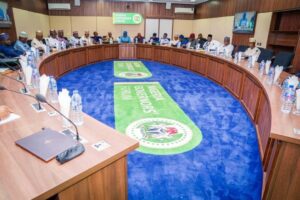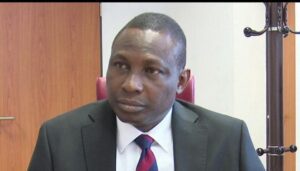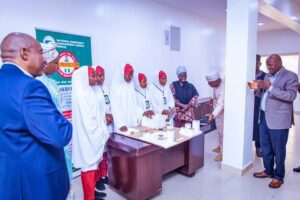


LCCI commends FG for suspending cybersecurity levy, seeks broader taxation
The Lagos Chamber of Commerce and Industry ( Lagos Chamber of Commerce and Industry) on Thursday commended the House of Representatives for asking CBN to suspend planned 0.5 percent cybersecurity levy due to public outcry.
The President and Chairman of the Council of LCCI, Mr Gabriel Idahosa, gave the commendation in an interview in Lagos.
Idahosa was responding to the suspension of the 0.5 percent cybersecurity levy on online transactions, which was earlier directed by CBN on Monday.
The LCCI boss, in an earlier interview, warned of backlash and called for reversal or suspension of the levy to prevent hardship.
The House of Representatives during the plenary on Thursday told CBN to withdraw the circular, which directed all banks to implement the levy two weeks after May 6.
Speaking on suspension, Idahosa said President Bola Tinubu’s administration had been a listening one, citing examples, including when it halted a policy on cash distribution.
“The Government has consistently shown their willingness to listen to the concerned public,” he said.
He also commended federal lawmakers for demonstrating their commitment to pursuit of policies accepted by the citizens, adding that policies succeed when the people and government were in agreement.
“So, we must commend the National Assembly that they are very much on the same page with Nigerians,” he said.
Idahosa, however, appealed to the federal government to expand its tax net to capture 60 percent of critical stakeholders currently excluded from taxation to raise needed revenue to run Nigeria’s economy.
He said tax reform surveys revealed that countries with fewer taxes collected more revenue to fund large sectors of their economies.
Idahosa cited South Africa as an example of the most successful tax revenue collecting country in Africa with only about 10 items of taxes where they generated enough revenue to fund all sectors.
“The unmistakable data is that the countries that have fewer taxes collect much more taxes, so they have funds for all sectors of the economy.
“They collect very large level of revenue from the main taxes, corporate taxes and income taxes and they have money for health, education, cybersecurity, for everything under the sun,” he said.
He said the practice of collecting taxes for every sector or activities in the nation should be jetisoned for the adoption of the more effective collection methods of fewer taxes capturing critical stakeholders.
He said tax collection logistics was expensive, adding that 60 percent of regular taxes in the nation were not being collected because of inadequate man manpower to handle the collections.
Idahosa said if corporate and income taxes were collected through full coverage of Nigeria, the funds would be more than enough to meet national needs.
“So, the whole idea that for everything that happens you have to collect the levy, levy for ITF for training, levy for Police Fund, levy for cybersecurity, means first of all that the cost of tax collection rises heavily.
“These collections are not cost free. You are going to set up structures, computer systems and people to monitor collections. So, the cost of collection and revenue collected per tax begins to show diminishing returns.
“Rather, government should put its energy in expanding the collection of the main taxes. Corporate income tax, personal income tax, Value Added Tax (VAT). In fact, VAT alone can provide enough resources and raise the tax revenue to the GDP of Nigeria closer to countries like South Africa that are doing extremely well.
“So, the fundamental principle is that, you don’t have to collect tax for every little thing but focus on the capacity and the efficiency and the wide reach of your primary revenue collecting agency which is the Federal Inland Revenue Service (FIRS),” he said.
According to him, more than 60 percent of the people who are supposed to pay corporate income taxes are not paying because the coverage of the FIRS has not been spread wide enough across the country.
“Outside the state capitals and a few big cities, you don’t see FIRS collecting taxes from all the companies in our sub urban areas.
“So, that is the basic principle, intensive collection from your primary revenue agency and having enough funds to meet the needs of all sectors and services in the economy,” he said.
The LCCI boss said the suspended 0.5 percent cybersecurity levy came as a surprise because the federal government had set up a committee to reduce the total number of taxes in Nigeria.
He explained that there were about 100 different kinds of taxes being paid by the business community,
He said most businesses in the nation were currently running on either losses or survival profits due to current exchange rates, interest rates, cost of borrowing and other economic issues affecting the nation.



